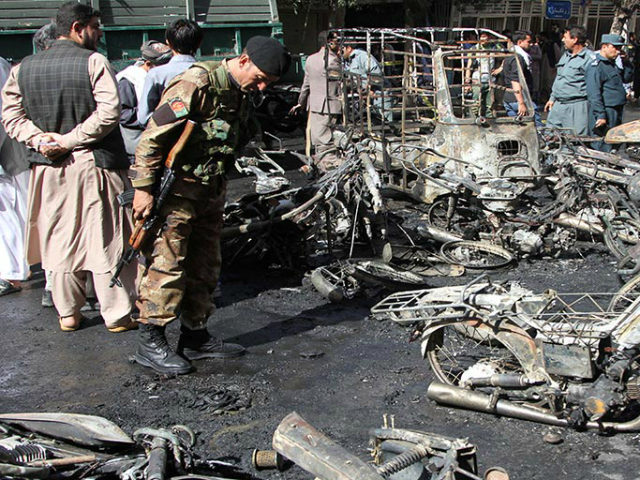Unknown terrorists detonated a suspected bomb in Afghanistan’s western province of Herat, which sits along the country’s border with Iran, as people made their way to an ancient mosque for prayers Tuesday, killing up to ten people and wounding at least 15 others.
The deadly incident is the latest in a bloody wave of attacks that have hit the war-ravaged country since May 27, the first full day of Ramadan, the holiest month for Muslims.
CNN learned from Jilani Farhad, a spokesman for the governor of Herat, that Tuesday’s blast took place near the northern gate of the Great Mosque of Herat, which dates from the twelfth century.
No group has officially claimed responsibility for the attack. The Afghan Taliban, the strongest and most prominent group in the country, has reportedly denied any involvement. However, the Taliban, echoing other Islamic terrorist groups, has said jihad is “obligatory” during Ramadan.
The Islamic State (ISIS/ISIL), which has established a branch in the Afghanistan region, has urged its members and sympathizers to wage an “all-out war” during the holy month.
While the majority of Muslims abide by the tradition of abstaining from eating, drinking, smoking, having sex, and other physical needs each day, starting from before the break of dawn until sunset on Ramadan, others believe jihad and martyrdom during the ongoing holy month are doubly rewarded in paradise.
Afghanistan has been hit particularly hard by deadly attacks in the first 12 days of Ramadan.
Nine attacks have already occurred in Afghanistan, including the May 31 massacre in the capital of Kabul that left an estimated 150 people dead and more than 400 wounded. Taliban jihadists have also denied any involvement in that attack.
However, the country’s intelligence agency, the National Directorate of Security (NDS), has blamed the attack on Pakistan, considered a terrorist sanctuary, and the Haqqani Network, a jihadist group affiliated with the Taliban and al-Qaeda.
Islamabad and the Taliban, apparently speaking on behalf of the Haqqanis, have denied the NDS allegations.
The Kabul attack has been deemed one of the deadliest in Afghanistan since the war started back in October 2001.
According to the Pentagon’s latest assessment of the Afghanistan war, “Of the groups involved in the Taliban-led insurgency, the Haqqani Network remains the greatest threat to U.S., coalition, and Afghan forces and continues to be a critical enabler of al Qaeda.”
“Militant groups, including Taliban and Haqqani senior leadership, retained safe havens inside Pakistani territory,” it added.
In September 2016, U.S. Gen. John Nicholson, the top commander of American and NATO troops in Afghanistan, told reporters that Islamabad is not applying “adequate pressure” on the Haqqani Network to “justify additional coalition support funds to Pakistan.”
Since the holy month of Ramadan began, jihadists, particularly the Taliban, have killed more than 220 people and wounded nearly 590 in Afghanistan alone. About 20 days of the holy month remain.
Terrorist attacks usually increase during Ramadan, but already this year’s death toll has surpassed the one from last year, making 2017 one of the bloodiest Ramadans in recent memory.

COMMENTS
Please let us know if you're having issues with commenting.